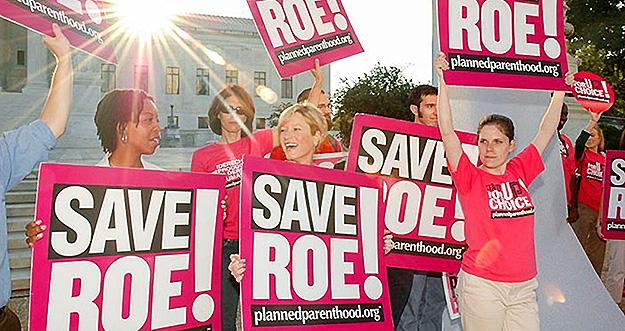SCOTUS Ruling Limiting Reproductive Rights Sparks Concerns and Protests

This has been a heavy season. In addition to the COVID-19 pandemic, dangerous under-staffing at healthcare facilities, and senseless mass shootings and gun violence, many Americans were gutted when the U. S. Supreme Court ruled in Dobbs v. Jackson Women’s Health to overturn Roe v. Wade.
The Supreme Court disrupted nearly 50 years of reproductive health protections when it made this monumental decision. With no legal right to abortion guaranteed nationwide, each state will now determine women and pregnant people’s rights to healthcare, including abortion. That there are no exceptions in cases of rape and incest is particularly cruel.
Immediate Pain
Unfortunately, several states (13) had trigger laws meaning abortion would be banned within 30 days of Roe v. Wade being overturned. The procedure is now banned or mostly banned in Utah, Arizona, Texas, Oklahoma, South Dakota, Louisiana, Arkansas, Montana, Wisconsin, Ohio, Tennessee, South Carolina and Alabama. It may also soon be banned in states such as Mississippi, North Dakota, Wyoming, and Idaho. In 20 states, including New York, and the District of Columbia, abortion is legal and likely to be protected.
NYSNA members have always been proud to defend women’s rights and advocate for health equity and universal access to healthcare. As nurses and healthcare professionals in New York State, we have an important role to play in guaranteeing and expanding reproductive healthcare for all New Yorkers and for patients from other states who seek our care. This is not just about access to abortion, but reproductive freedom.
In recent years, as states around the country began restricting women’s access to abortion services, New York’s healthcare professionals responded with compassionate, quality care. We expect that this ruling will increase demand on New York’s public and private sector healthcare facilities. NYSNA is committed to working with our elected leaders to strengthen our healthcare system to provide women and pregnant people the quality care they deserve.
Bodily Autonomy
Healthcare is a human right, and abortion is healthcare. The right to bodily autonomy is a key principle nurses learn from our earliest days in nursing school and this belief guides our work to provide dignified care to every patient. We are deeply disappointed that the Supreme Court has failed to uphold our human rights, and we believe their decision today will cause harm to thousands of pregnant people, children, and families throughout the country. The U.S. already has one of the highest maternal mortality and infant mortality rates of any high-income nation, and our maternal mortality rates are rising. Maternal mortality rates are alarmingly high for Black mothers and babies. For instance, the CDC reported that “In 2020, the maternal mortality rate for non-Hispanic Black women was 55.3 deaths per 100,000 live births, 2.9 times the rate for non-Hispanic White women (19.1) Rates for non-Hispanic Black women were significantly higher than rates for non-Hispanic White and Hispanic women.” We fear the court’s ruling will further increase healthcare disparities and deepen this public health crisis.
Forced Motherhood
The decision in Dobbs v. Jackson Women’s Health is likely to force motherhood on persons who would choose otherwise. It will have a profound impact on vulnerable communities.
As NYSNA President Nancy Hagans, RN, BSN, CCRN has said, “This legal decision will deeply impact marginalized communities, especially women and people of color. No one should be forced into labor or into making dangerous choices. As a union predominantly of women, we understand how important it is to make your own reproductive choices. Economic, social, and reproductive justice are inextricably linked, and we must all do our part to fight for these rights.”
Echoing this sentiment, the Rev. Dr. Cari L. Jackson, director of spiritual care and activism, Religious Coalition for Reproductive Choice, said,
“The Religious Coalition for Reproductive Choice is the child, if you will, of the Clergy Consultation Service that was formed in the 1960s. These women understood that women have a divine right to make decisions about their own bodies. They knew that patriarchy and domination were not going to end in this country and formed the Religious Coalition for Reproductive Choice. We know now, as they knew then, that patriarchy and this tendency towards domination is destructive. Moreover, there is also a strong movement for theocracy that would replace democracy. This is an issue of religious freedom, of class and of economics. This decision really subjects, sentences, and predestines pain and generational poverty. We must address these issues all together.
”For many of us, the overturning of Roe v. Wade is deeply troubling. There have also been coast to coast protests, as concerned individuals and families make their voices heard. We must work so it is only a temporary set-back in our progress as a people. We are more committed than ever to working to uphold women’s rights and reproductive freedom here in New York, while continuing to work together for a future where women and pregnant people’s rights and quality healthcare for all is guaranteed — everywhere.
Sources
https://www.washingtonpost.com/politics/2022/06/24/abortion-state-laws-criminalization-roe/
https://www.cdc.gov/nchs/data/hestat/maternal-mortality/2020/maternal-mortality-rates-2020.htm
The right to bodily autonomy is a key principle nurses learn from our earliest days in nursing school and this belief guides our work to provide dignified care to every patient.”